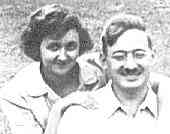JULIUS AND ETHEL
(BOB DYLAN) (1983)




Julius Rosenberg and his wife were listening to the Lone Ranger with their two young sons when a stranger rapped on the door of their battered and drab apartment near the Manhattan end of the Brooklyn Bridge. Twelve men filed in from the small hallway and announced that they were from the FBI. They arrested 32-year-old Julius Rosenberg as a spy.A puffy, spectacled native New Yorker with a smudge-sized mustache and disappearing black hair, Rosenberg was the fourth U.S. citizen arrested in the atomic spy roundup that began after the arrest of British Physicist Klaus Fuchs. The FBI said Rosenberg had been an important cog in the machinery, working directly under Anatoli Yakovlev, Soviet vice consul in New York. An electrical engineer (C.C.N.Y., class of '39), Rosenberg had been an inspector for the War Department's Signal Service until early 1945, when he was fired for Communist affiliations. He broke off all open contracts with the party, quit subscribing to the Daily Worker and set up as the owner of a small, non-union machine shop in Manhattan. But the FBI kept its many eyes on him.
It was he, said the FBI, who recruited his brother-in-law, David Greenglass, for the spy ring when Greenglass was on furlough from his sergeant's duties at the Los Alamos A-bomb project. Rosenberg tore the top of a Jello box in half, gave a piece to Greenglass as his badge of identification and told him that his contact at Los Alamos would produce the other half. The contact turned out to be Spy Courier Harry Gold, the Philadelphia chemist, who got atomic-energy data from Greenglass and paid him $500.
After the arrest of Fuchs and Gold, said the FBI, Rosenberg told Greenglass to leave the country and report to the Soviet embassy in Czechoslovakia; he gave him "substantial funds in 20-dollar bills" to do so (reportedly $5,000). But before he could get away, the FBI got Greenglass, and he talked. Julius Rosenberg was not surprised when the FBI came for him.
Alone of the four arrested so far, Rosenberg stoutly insisted on his innocence. The FBI's story, said he, was "fantastic--something like kids hear on the Lone Ranger program." Three days after Rosenberg's arrest, Harry Gold pleaded guilty in federal court to all the FBI's charges.

Judge Irving Kaufman looked down at the man and woman before him. "Plain, deliberate, contemplated murder is dwarfed in magnitude by comparison with the crime you have committed," he told Julius and Ethel Rosenberg in a hoarse, faint voice. "I believe your conduct in putting into the hands of the Russians the A-bomb...has already caused the Communist aggression in Korea...and who knows but that millions more of innocent people may pay the price of your treason.""I have deliberated for hours, days and nights," said Judge Kaufman. "I have searched my conscience to find some reason for mercy. I am convinced, however, that I would violate the solemn and sacred trust that the people of this land have placed in my hands were I to show leniency... The sentence of the court upon Julius and Ethel Rosenberg is that, for their crime, they are sentenced to death."
Sallow Julius Rosenberg and his wife were led away. Later, in their adjoining cells, the Rosenbergs sang to each other: her choice was Puccini's One Fine Day, his The Battle Hymn of the Republic.
There would be appeals. But though higher courts may reverse the conviction, none may reduce the sentences. If the sentences are carried out, the Rosenbergs will be the first spies ever executed by order of the U.S. civil court.


Now that they are gone, you know, the truth it can be told;
They were sacrificial lambs in the market place sold --
Julius and Ethel, Julius and Ethel.Now that they are gone, you know, the truth it can come out;
They were never proven guilty beyond a reasonable doubt --
Julius and Ethel, Julius and Ethel.The people said they were guilty at the time;
Some even said there hadn't a-been any crime --
Julius and Ethel, Julius and Ethel.People look upon this couple with contempt and doubt,
But they loved each other right up to the time they checked out --
Julius and Ethel, Julius and Ethel.Eisenhower was president, Senator Joe was king;
Long as you didn't say nothing you could say anything --
Julius and Ethel, Julius and Ethel.Now some they blamed the system, some they blamed the man;
Now that it is over, no one knows how it began --
Julius and Ethel, Julius and Ethel.Every kingdom got to fall, even the Third Reich;
Man can do what he pleases but not for as long as he like --
Julius and Ethel, Julius and Ethel.Well, they say they gave the secrets of the atom bomb away;
Like no one else could think of it, it wouldn't be here today --
Julius and Ethel, Julius and Ethel.Someone says the fifties was the age of great romance;
I say that's just a lie, it was when fear had you in a trance --
Julius and Ethel, Julius and Ethel.


